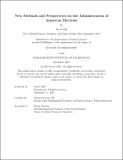New Methods and Perspectives on the Administration of American Elections
Author(s)
Jaffe, Jacob
DownloadThesis PDF (2.451Mb)
Advisor
Stewart III, Charles
Terms of use
Metadata
Show full item recordAbstract
This dissertation uncovers and answers three questions about the administration of American elections. First, why do voters choose on form of voting method over another? The second puzzle is how accurately votes are tabulated within the United States? Third and finally, when inaccuracies in the tabulation of votes in U.S. elections are uncovered, how do voters respond? Election administration is a field of increasing partisan rancor in the United States. Donald Trump has claimed that in some cases voting by mail in 2020 was fraudulent and responsible for his defeat. In this context, it is key to understand why voters choose to vote by mail when compared to other voting methods. Then, to contextualize these claims it is necessary to measure how many errors are detected in American elections. While tabulation errors are not common, they do occur. Given the importance of political trust and existing rhetoric on the accuracy of voting tabulation, it is important to present voters with situations that reflect the types of errors that occur in real elections. Overall, I by using a large field experiment I find that convenience in the form of lowered information costs has a significant impact on usage of vote by mail. Then, I find that detected rates of tabulation errors in post-election audits varies dramatically across states, likely due to administrative differences in how re-tabulation is performed. Finally, I present a number of Americans with a survey experiment that varies the information they receive about a post-election audit, including the number of tabulation errors discovered. I find that most Americans do not fail to trust elections with a relatively small number of errors, though they are still extremely vulnerable to partisan messaging about the trustworthiness of elections.
Date issued
2023-09Department
Massachusetts Institute of Technology. Department of Political SciencePublisher
Massachusetts Institute of Technology